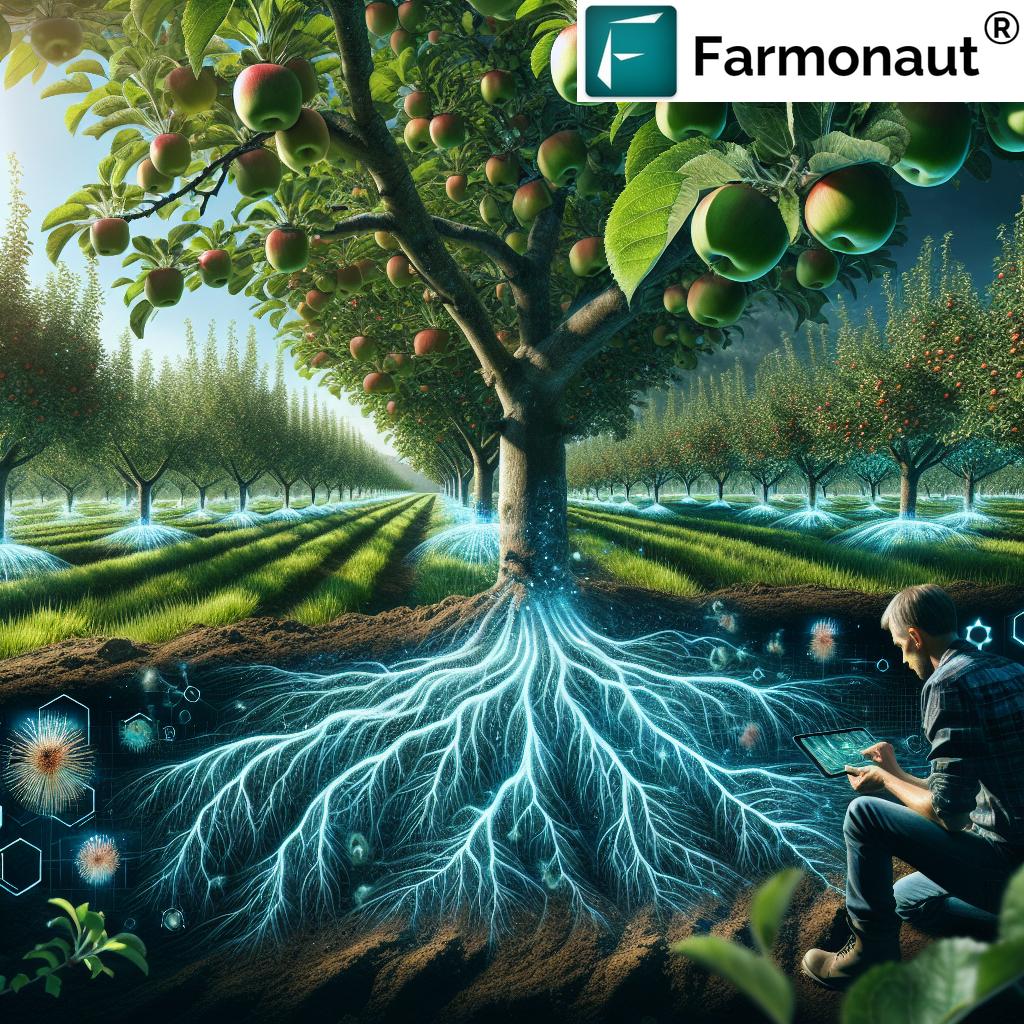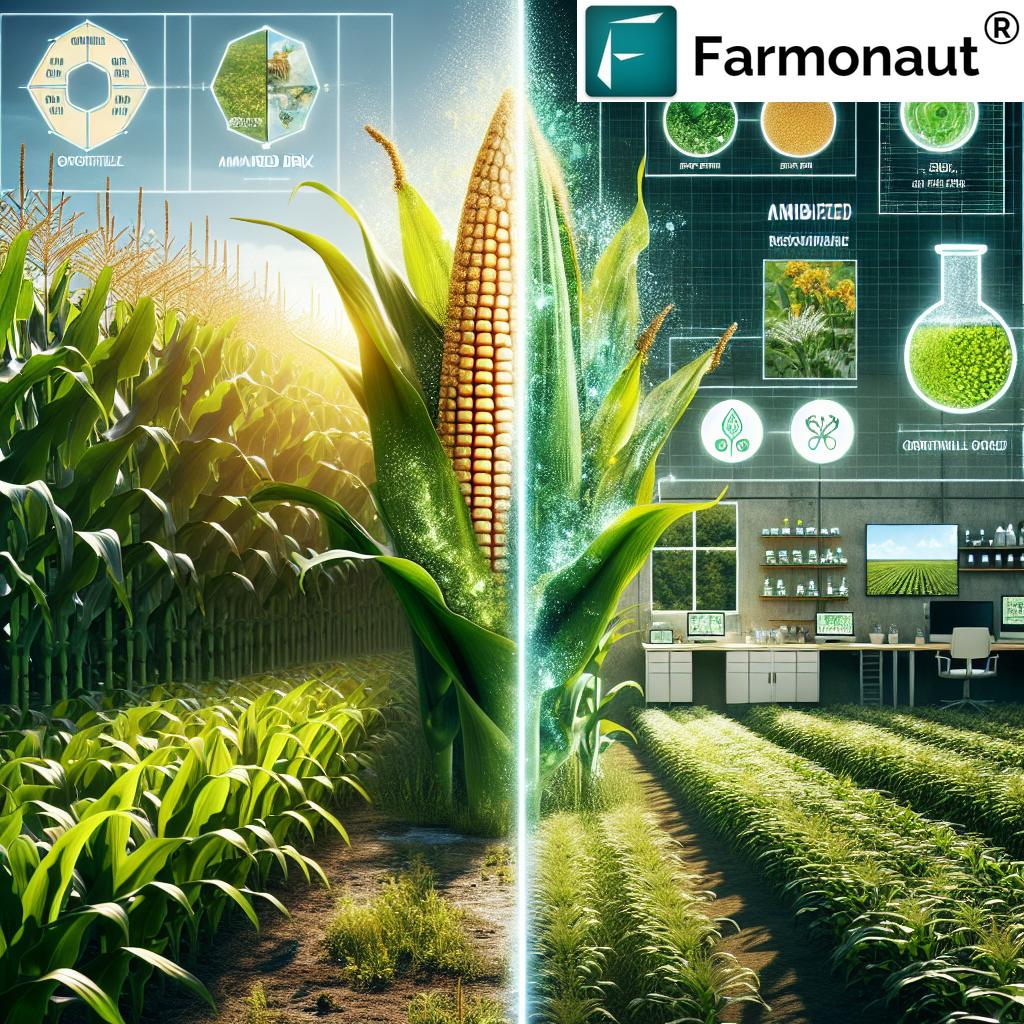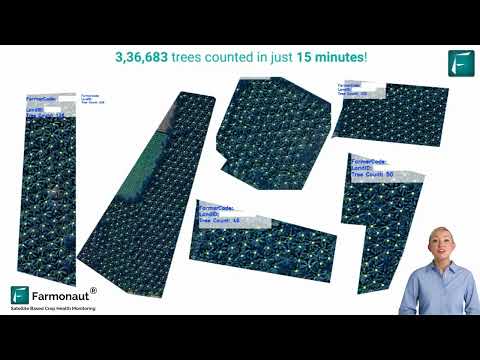Revolutionizing Tree Health: Innovative Biostimulants and Organic Solutions in Illinois Agriculture
“Biostimulants can increase BRIX levels in plants by up to 20%, enhancing natural pest resistance.”
Welcome to a groundbreaking exploration of sustainable tree care and innovative agriscience technologies that are transforming the landscape of Illinois agriculture. In this comprehensive guide, we’ll delve into cutting-edge solutions that are revolutionizing plant health, with a particular focus on trees and shrubs. From organic plant health solutions to advanced biostimulants for agriculture, we’re about to embark on a journey that will change the way you think about tree care.
The Evolution of Tree Care in Illinois
Illinois, with its rich agricultural heritage, has long been at the forefront of innovative farming practices. Today, we’re witnessing a paradigm shift in how we approach tree health and plant care. Gone are the days when traditional NPK fertilizers were the only solution. We’re now entering an era where environmental tree treatments and natural pest control methods are taking center stage.
In the heart of this revolution is Monroe County, Illinois, where visionaries like Stan Clement are paving the way for a greener, more sustainable future. Clement’s journey from East St. Louis to founding Roots Plus: Innovative Root Solutions in Columbia, Illinois, is a testament to the growing demand for eco-friendly plant care solutions.

The Power of Biostimulants in Agriculture
Biostimulants are at the forefront of this agricultural revolution. These organic compounds are designed to enhance plant growth, health, and productivity. Unlike traditional fertilizers that simply provide nutrients, biostimulants work by stimulating natural processes within plants and soil to improve nutrient uptake, tolerance to abiotic stress, and overall crop quality.
- Enhanced Nutrient Efficiency: Biostimulants improve the plant’s ability to absorb and utilize nutrients from the soil.
- Stress Tolerance: They help plants withstand environmental stresses such as drought, heat, and salinity.
- Root Development: Many biostimulants promote robust root growth, leading to healthier, more resilient plants.
- Increased Yield: By optimizing plant processes, biostimulants can significantly boost crop yields.
In Illinois, farmers and arborists are increasingly turning to biostimulants as a key component of their tree care and crop management strategies. These innovative products are proving to be game-changers in sustainable agriculture.
Organic Plant Health Solutions: A New Paradigm
As we move away from synthetic chemicals, organic plant health solutions are gaining traction. These natural alternatives not only promote plant health but also contribute to soil fertility and ecosystem balance. In Illinois, companies like Roots Plus are leading the charge with their emphasis on environmentally friendly, non-synthetic products.
Key components of organic plant health solutions include:
- Beneficial Bacteria: These microscopic allies improve soil structure and nutrient availability.
- Mycorrhizal Fungi: These form symbiotic relationships with plant roots, enhancing nutrient uptake.
- Natural Pest Deterrents: Plants like neem and pyrethrum offer organic pest control options.
- Compost and Organic Matter: These improve soil health and provide slow-release nutrients.
By adopting these organic solutions, Illinois farmers are not only improving the health of their trees and crops but also contributing to the long-term sustainability of their land.
Environmental Tree Treatments: Nurturing Nature
Environmental tree treatments represent a holistic approach to tree care that considers the entire ecosystem. These treatments focus on creating optimal conditions for tree growth while minimizing ecological impact. In Illinois, this approach is particularly relevant given the state’s diverse landscapes, from urban areas to rural farmlands.
Key aspects of environmental tree treatments include:
- Soil Health Management: Improving soil structure and microbial activity.
- Water Conservation: Implementing efficient irrigation systems and mulching techniques.
- Integrated Pest Management: Using natural predators and resistant plant varieties to control pests.
- Pruning and Structural Care: Maintaining tree health through proper pruning and support techniques.
These treatments not only benefit individual trees but also contribute to the overall health of the surrounding ecosystem, making them an essential component of sustainable agriculture in Illinois.
The Role of Beneficial Bacteria in Plant Health
Beneficial bacteria play a crucial role in plant health, forming a cornerstone of modern agriscience technology. These microscopic organisms, when applied to soil or plant surfaces, can dramatically improve plant growth and resilience. In Illinois, the use of beneficial bacteria is revolutionizing tree care and agricultural practices.
Here’s how beneficial bacteria contribute to plant health:
- Nutrient Cycling: They help break down organic matter, releasing nutrients for plant uptake.
- Disease Suppression: Many beneficial bacteria produce compounds that inhibit pathogenic microorganisms.
- Root Growth Promotion: Some bacteria stimulate root development, enhancing nutrient and water uptake.
- Stress Tolerance: Certain bacterial strains help plants better withstand environmental stresses.
By incorporating beneficial bacteria into their tree care regimens, Illinois farmers and arborists are seeing remarkable improvements in plant health and productivity.
Natural Pest Control for Trees: A Sustainable Approach
Natural pest control methods are gaining popularity in Illinois as farmers and homeowners seek alternatives to chemical pesticides. These eco-friendly approaches not only protect trees from pests but also preserve beneficial insects and maintain ecological balance.
Effective natural pest control strategies include:
- Companion Planting: Growing pest-repelling plants alongside trees.
- Biological Control: Introducing natural predators of pest species.
- Physical Barriers: Using tree wraps or sticky bands to prevent pest access.
- Organic Sprays: Applying neem oil, garlic spray, or other natural deterrents.
These methods, when combined with proper tree care and maintenance, can significantly reduce pest problems without resorting to harmful chemicals.
Innovative Tree Fertilization Techniques
Tree fertilization has come a long way from the traditional NPK (Nitrogen, Phosphorus, Potassium) approach. Today, innovative techniques focus on providing a more comprehensive range of nutrients and promoting overall soil health. In Illinois, companies like Roots Plus are pioneering these advanced fertilization methods.
“Liquefied sea minerals contain over 90 trace elements, providing more comprehensive nutrition than traditional NPK fertilizers.”
Some cutting-edge tree fertilization techniques include:
- Liquefied Sea Minerals: Providing a rich source of trace elements essential for tree health.
- Slow-Release Organic Fertilizers: Offering sustained nutrition over extended periods.
- Foliar Feeding: Applying nutrients directly to leaves for rapid absorption.
- Mycorrhizal Inoculation: Introducing beneficial fungi to enhance nutrient uptake.
These innovative approaches ensure that trees receive a balanced diet of nutrients, promoting robust growth and increased resistance to pests and diseases.

The Importance of Root Care in Tree Health
Root health is fundamental to overall tree vitality, yet it’s often overlooked. In Illinois, where soil conditions can vary greatly, proper root care is essential for maintaining healthy trees and shrubs. Innovative root care solutions focus on creating optimal conditions for root growth and function.
Key aspects of root care include:
- Soil Aeration: Improving oxygen availability to roots.
- Mulching: Maintaining soil moisture and temperature.
- Root Zone Fertilization: Applying nutrients directly to the root area.
- Biochar Application: Enhancing soil structure and microbial activity.
By prioritizing root health, Illinois farmers and arborists are laying the foundation for stronger, more resilient trees.
Enhancing BRIX Levels in Plants
BRIX level is a crucial indicator of plant health, measuring the concentration of dissolved solids in plant sap. Higher BRIX levels are associated with improved plant vigor, better taste in fruits, and increased resistance to pests and diseases. In Illinois agriculture, techniques to enhance BRIX levels are gaining attention.
Methods to increase BRIX levels include:
- Balanced Nutrition: Providing a full spectrum of nutrients, including trace minerals.
- Soil Health Improvement: Enhancing microbial activity and organic matter content.
- Foliar Applications: Using specific nutrient blends to boost photosynthesis.
- Stress Reduction: Implementing proper irrigation and pest management strategies.
By focusing on BRIX levels, Illinois farmers are not only improving crop quality but also reducing the need for pest control measures.
The Future of Agriculture: From Seeds to Mature Trees
The future of agriculture in Illinois is bright, with innovative approaches transforming every stage of plant growth, from seeds to mature trees. These advancements are not only improving crop yields and tree health but also promoting sustainability and environmental stewardship.
Key trends shaping the future of agriculture include:
- Precision Agriculture: Using data and technology to optimize farming practices.
- Vertical Farming: Maximizing space and resources in urban environments.
- Regenerative Agriculture: Focusing on soil health and ecosystem restoration.
- Agroforestry: Integrating trees and shrubs into agricultural landscapes.
These innovative approaches are setting the stage for a more resilient and sustainable agricultural sector in Illinois.
Leveraging Technology for Better Plant Health
In the digital age, technology plays a crucial role in modern agriculture and tree care. Farmers and arborists in Illinois are increasingly turning to advanced tools to monitor and manage plant health more effectively. One such innovative solution is provided by Farmonaut, a company at the forefront of agricultural technology.
Farmonaut’s satellite-based farm management solutions offer valuable insights for tree health monitoring and precision agriculture. Their platform provides real-time data on vegetation health, soil moisture levels, and other critical metrics, enabling farmers to make informed decisions about irrigation, fertilizer usage, and pest management.
Key features of Farmonaut’s technology include:
- Satellite-based crop health monitoring
- AI-driven personalized farm advisory
- Weather forecasting for agricultural planning
- Resource management tools for efficient farming
By integrating these technological solutions, Illinois farmers can optimize their tree care and crop management strategies, leading to healthier plants and improved yields.
To explore how Farmonaut’s technology can revolutionize your farming practices, visit their website or download their mobile app:
Comparison: Traditional vs. Innovative Tree Health Solutions
| Aspect | Traditional Methods | Innovative Solutions | Effectiveness Rating |
|---|---|---|---|
| Fertilization | NPK chemical fertilizers | Biostimulants, liquefied sea minerals | ★★★★☆ |
| Pest Control | Chemical pesticides | Natural predators, organic repellents | ★★★★★ |
| Root Care | Basic watering and mulching | Mycorrhizal inoculation, biochar application | ★★★★☆ |
| Soil Health | Occasional tilling, chemical amendments | Beneficial bacteria, organic matter enhancement | ★★★★★ |
| Stress Management | Reactive treatments | Proactive care, BRIX level enhancement | ★★★★☆ |
Implementing Innovative Tree Care in Your Farm or Garden
Adopting these innovative tree care solutions in your Illinois farm or garden doesn’t have to be overwhelming. Here are some practical steps to get started:
- Soil Testing: Begin with a comprehensive soil analysis to understand your starting point.
- Gradual Transition: Start by incorporating biostimulants and organic solutions in a small area.
- Education: Attend workshops or consult with local experts on sustainable tree care practices.
- Monitor Progress: Keep detailed records of treatments and observe changes in plant health.
- Adapt and Refine: Be prepared to adjust your approach based on results and new learnings.
Remember, the journey to sustainable tree care is ongoing, and patience is key as you transition to these new methods.
The Role of Technology in Modern Tree Care
Technology is playing an increasingly important role in tree care and agriculture. From satellite imaging to AI-driven analytics, these tools are helping farmers and arborists make more informed decisions about plant health.
Farmonaut’s API and developer tools offer exciting possibilities for integrating advanced agricultural data into your farm management systems. For those interested in leveraging these technologies, explore Farmonaut’s API documentation:
By harnessing the power of data and technology, Illinois farmers can take their tree care and crop management to the next level.
Conclusion: Embracing a Greener Future in Illinois Agriculture
As we’ve explored in this comprehensive guide, the future of tree health and agriculture in Illinois is bright, thanks to innovative biostimulants, organic solutions, and cutting-edge technologies. By embracing these sustainable practices, farmers and gardeners across the state can not only improve the health of their trees and crops but also contribute to a more resilient and eco-friendly agricultural landscape.
From the use of beneficial bacteria and natural pest control methods to the implementation of advanced root care techniques and technology-driven farming solutions, the options for revolutionizing tree health are vast and exciting. As we move forward, it’s clear that the integration of these innovative approaches will play a crucial role in shaping the future of Illinois agriculture.
We encourage you to explore these new methods, experiment with sustainable solutions, and leverage technology to enhance your agricultural practices. Together, we can create a greener, more productive future for Illinois agriculture, one tree at a time.
FAQ Section
Q: What are biostimulants, and how do they benefit trees?
A: Biostimulants are organic compounds that enhance plant growth, health, and productivity. They improve nutrient uptake, stress tolerance, and overall plant vigor, leading to healthier and more resilient trees.
Q: How can I transition to organic tree care methods on my farm?
A: Start by conducting a soil test, then gradually introduce organic fertilizers, beneficial bacteria, and natural pest control methods. Monitor the results and adjust your approach as needed.
Q: What role does technology play in modern tree care?
A: Technology, such as satellite imaging and AI-driven analytics, helps farmers monitor tree health, optimize resource use, and make data-driven decisions about care and management.
Q: How can increasing BRIX levels benefit my trees?
A: Higher BRIX levels indicate better plant health, increased resistance to pests and diseases, and improved fruit quality in fruit-bearing trees.
Q: Are these innovative tree care methods more expensive than traditional approaches?
A: While initial costs may be higher, many farmers find that the long-term benefits of improved tree health, reduced pest problems, and increased productivity offset the investment.






